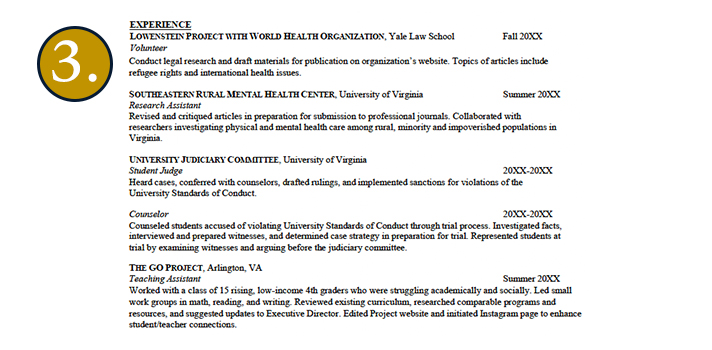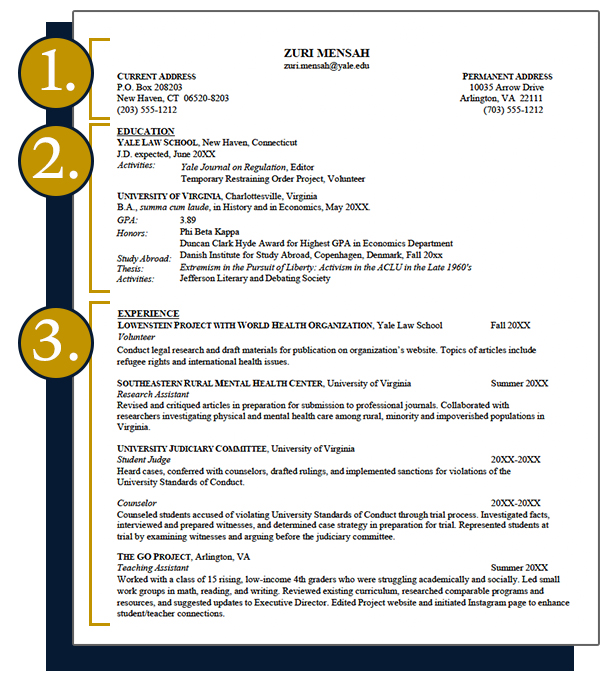Overview
- Review your resume with a CDO counselor prior to applying to jobs.
- Your resume is a sales tool, not an autobiography. When making decisions about what to include, consider recency and relevancy to the job for which you are applying.
- Be prepared to discuss everything on your resume in an interview.
- Be scrupulously honest. Exaggerations or misrepresentation will damage your reputation and professional relationships.
- Make your resume visually clean and clear. What will an employer see in 30 seconds? 5 seconds?
The Basics
- Keep your resume to one page.
- Use a standard font such as Times New Roman or Garamond.
- Select a font size of 11 point or 12 point.
- Create margins no smaller than .5 inches on all sides.
- Use bold, underlining, and italics consistently to enhance readability.
- Select either bullet points or a paragraph format for your position descriptions.
- Make deliberate style choices, then stick to them throughout.
- Ensure your resume is error free.
- Follow our advice, “Resume Formatting: How to Use Tabs & Styles2” to give your resume a professional look.
Resume Construction
Heading

- Include your name, mailing address, cell number, and Yale email address.
- If you do not have a mailing address in New Haven, that is fine, as mailing addresses are becoming optional.
- Add your permanent mailing address to emphasize ties to that area when applying to positions nearby.
- List your gender pronouns if you wish.
Education Section

- List degrees in reverse chronological order.
- Include all courses of study: past, present, and future.
- List each educational institution, location, degree, and degree date (expected date if currently enrolled).
- Do not include high school or LSAT score.
- Think strategically about how much space you devote to each degree. What message are you sending to employers?
- Undergraduate GPA
- Include at your option with a strategic mindset.
- Honors:
- YLS awards few Honors.
- Moot court/mock trial awards and paper prizes are Honors.
- List Yale Law Journal as an Honor, due to the competitive admission process. List other journals as Activities or create a separate Journal sub-section under Yale Law School.
- Scholarships and fellowships:
- List those that are not based solely on financial need and are awarded through a competitive process.
- If space permits, provide a very brief description of the selection criteria.
- Examples: Tilman Scholarship; the Paul & Daisy Soros Fellowship for New Americans; and the NAACP LDF Earl Warren Civil Rights Scholarship.
- List scholarship or fellowship awards that are associated with summer or post-graduate employment with the position in the Experience section.
- Do not list need-based scholarships and fellowships, including SPIF funding, summer Mary McCarthy funding, and Kirby Simon travel grants.
- List the following positions as Activities or in the Experience section: Coker Fellow, Research Assistant, Orientation Leader, Community Leader, Student Representative, Tsai Leadership Program Fellow, and CDO Student Advisor.
- Activities:
- Use this section to emphasize relevant skills and interests including research and writing skills, oral advocacy, teamwork, and leadership.
- Narrow the list, if necessary, by selecting only one of several activities that are of the same genre.
- If applying for public service positions, include as many of your service-related activities as space permits to demonstrate your commitment to service.
- Move particularly relevant, intensive, or skills-enhancing activities to the Experience section. Example: clinics.
- Be clear about the timing of future commitments, however, describing the exact timing of past activities is not strictly necessary.
Optional Sections
- Select Courses
- Create a Select Courses sub-section to highlight courses that reflect your interest in a practice area.
- Tailor this section depending on your target employer(s).
- List courses you have already taken and courses you intend to take in the future (with a parenthetical indicating that the course is expected).
- Study Abroad
- Create a Study Abroad sub-section in your undergraduate education listing.
- Create a Study Abroad sub-section in your undergraduate education listing.
- Thesis
- Create a Thesis sub-section in your undergraduate education listing.
- Include especially if the topic relates to the law.
Experience Section

- List experiences in reverse chronological order.
- Include experiences to which you have committed, but not yet begun; describe using future-tense verbs.
- Include the name of the employer, the location, titles, and dates of employment.
- Dates can be general (e.g., Summer 20XX).
- Omit job titles if unimpressive or do not clarify your responsibilities, however, be consistent about including/excluding titles throughout.
- List experiences that demonstrate knowledge and skills in areas relevant to legal employers, especially research, writing, and analysis.
- Emphasize professional skills including organizational ability, leadership, initiative, creativity, communication skills, common sense, and intellectual ability.
- List both paid and unpaid experiences.
- Include work associated with a scholastic experience, including legal clinic experience, research for a professor, and extensive work for a student organization.
- Rewrite past descriptions written for different industries and audiences. Eliminate jargon and terminology unfamiliar to a general audience.
- Summarize smaller or less relevant positions to fill gaps. E.g., “Held various positions as salesclerk, server, and receptionist while in college.”
- Be prepared to discuss significant gaps at interviews.
- Think strategically about the amount of physical space devoted to each experience. More space = greater emphasis.
- Use action verbs and rich detail in descriptions. E.g., “researched and wrote memoranda on issues of jurisdiction and venue,” rather than “involved in assisting attorneys in the researching and writing of…”
Optional Sections
- Languages: List if relevant and/or skill level is high. May be useful to delineate written vs. spoken proficiency. Be scrupulously honest regarding skill level.
- Publications:
- Think strategically about employers’ impressions. Publications show writing skills, but a long list of publications may signal interest in an academic career which may not be well received by non-academic employers.
- Consider selective list or summary if publication list is long.
- Use Bluebook citation format.
- Be clear about co-authored pieces.
- Interests: Include a few special interests that may be compelling and serve as icebreaker topics during an interview.
- Other skills: list only relevant skills, eliminating those which are universal (e.g., MS Word) or unrelated to legal employers’ needs (e.g., C++ programming).
Do Not Include
- Objective or introductory statements.
- Personal information (e.g., marital status, parental status).
- Salary requirements.
- “References available on request.”
Think Ahead to Your Next Resume
Develop your skills and knowledge through career-related experiences
- Summer employment
- Student organizations
- Centers
- Journals
- Research Assistant positions
- Leadership positions

